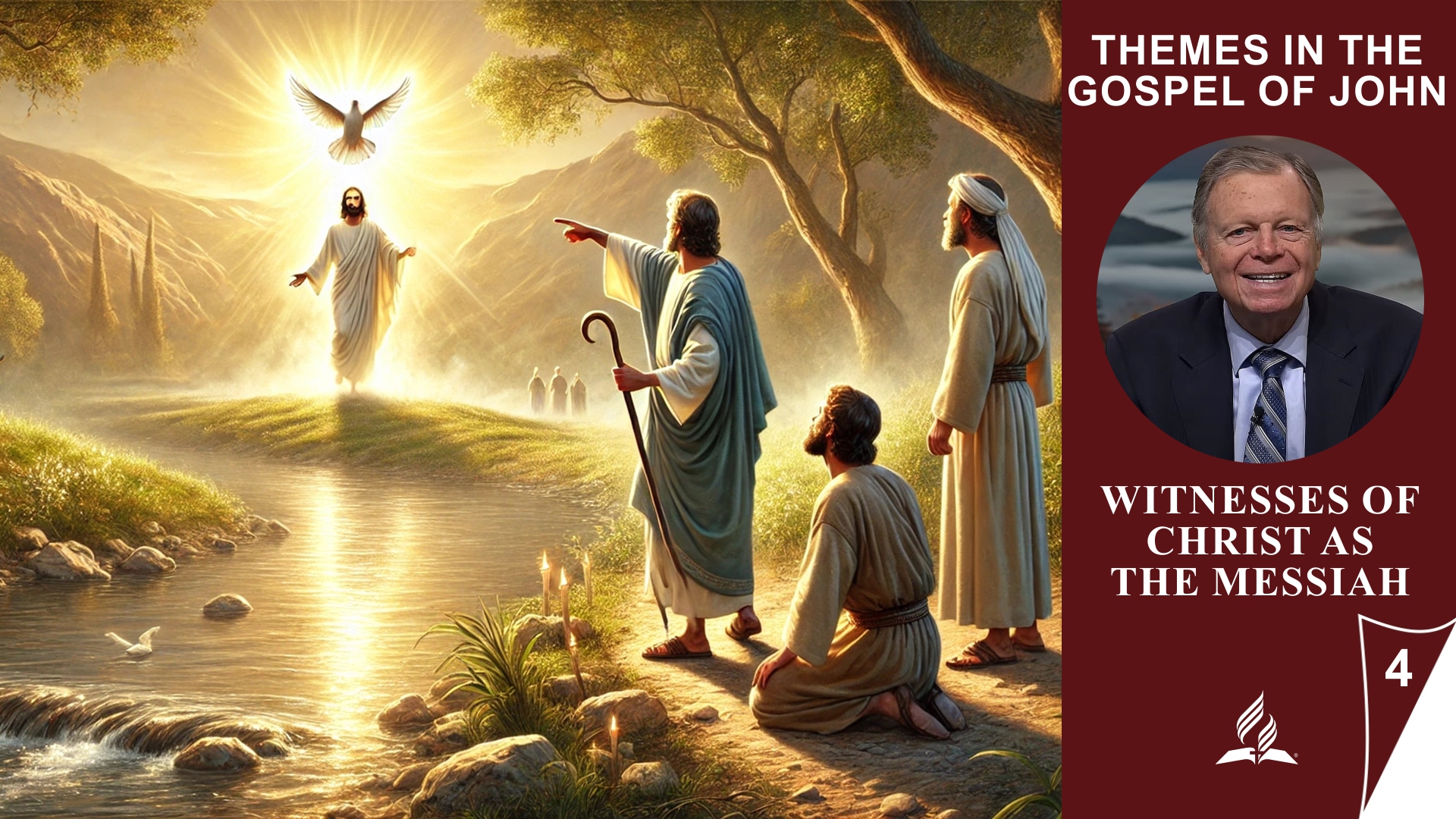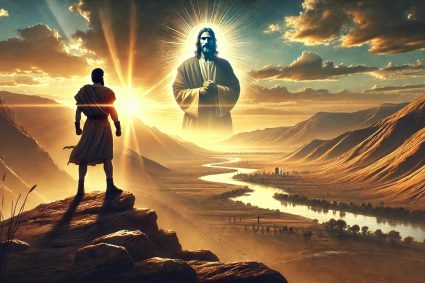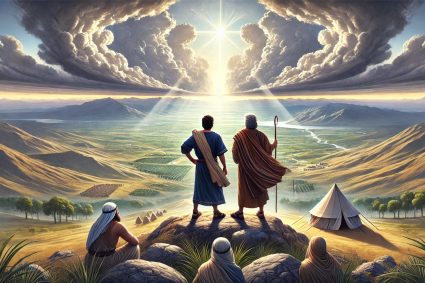
Series JESUS IN THE GOSPEL OF JOHN with Pastor Mark Finley |
Lesson 4.Witnesses of Christ as the Messiah |
Jesus Christ – The True Messiah |
Lesson 4 deals with the various testimonies that confirm Jesus Christ as the promised Messiah. The Gospel of John shows how different people—from John the Baptist to the first disciples—recognize Jesus as the Savior and point to Him. This lesson emphasizes that Jesus did not meet the expectations of a political or military savior but was the one who, through His sacrifice, was to renew the relationship between God and humanity. The testimonies we examine in this lesson reveal Jesus as the “Lamb of God” and fulfill the Old Testament promises about the Messiah. They invite us, just as the witnesses of that time did, to acknowledge Jesus as the true Savior.
Memory Text: John 3:3 – “Jesus answered and said to him, ‘Most assuredly, I say to you, unless one is born again, he cannot see the kingdom of God’.”
Content:
4.1 The Testimony of John the Baptist
John the Baptist: A Witness for the True Messiah
John the Baptist clearly understood his role as the forerunner of Jesus Christ. In John 1:19–23, he testifies that he is not the Messiah but merely one who points to the coming Savior. His mission was to prepare people for the Messiah’s arrival by directing their hearts toward repentance and spiritual renewal. John quoted Isaiah 40 to illustrate that he is the “voice crying out in the wilderness,” preparing the way of the Lord. As Seventh-day Adventists, we are similarly called to point to Christ and prepare people for His second coming through our service by proclaiming the message of repentance and salvation.
4.2 The Lamb of God
Jesus, the Lamb of God: The Messiah as a Sacrifice for the World
John the Baptist reveals Jesus as “the Lamb of God,” who takes away the world’s sin (John 1:29). This image of the lamb refers to the Old Testament sacrificial system, where lambs were offered as atonement sacrifices to atone for the people’s sins. Jesus fulfills this sacrificial promise by giving His own life to free humanity from sin. John’s proclamation corrects the misunderstood image of a military Messiah by presenting Jesus as the gentle and humble Savior who renews the relationship between God and humans through self-sacrifice. This conception of Jesus as the Lamb of God leads us to a deeper understanding of the high cost of redemption and God’s unconditional love.
4.3 The Two Disciples of John
The Disciples Recognize Jesus as the Messiah
When John the Baptist called Jesus “the Lamb of God,” two of his disciples decided to follow Him (John 1:35–39). They left John because they recognized that Jesus was the promised Messiah, greater than John. After spending time with Jesus, they felt deeply moved and inspired, prompting Andrew to immediately bring his brother Simon (Peter) to Jesus. This encounter changed their lives as they recognized the true Messiah. The Gospel of John illustrates the transformative power of encountering Christ and how it leads to spreading His message. Just as the disciples were changed, our faith in Christ calls us to also transform our lives and proclaim His message.
4.4 Philip and Nathanael
Nathanael: From Doubt to Faith
Philip demonstrates deep faith in Jesus when he tells Nathanael that they have found the one Moses and the prophets wrote about: Jesus of Nazareth (John 1:43–46). Despite Nathanael’s skepticism due to prejudices against Nazareth, Philip simply invites him to “come and see.” This invitation shows that true conviction often comes through personal encounter and experience. When Nathanael meets Jesus, he recognizes through Jesus’ knowledge of his life and prayers that Jesus is the promised Messiah. Nathanael makes a profound confession of faith by acknowledging Jesus as Rabbi, Son of God, and King of Israel. This encounter shows how Jesus, through divine insight, can bring revelation and faith even to the most skeptical hearts.
4.5 The Witness of Nicodemus
Nicodemus and the Necessity of Spiritual Rebirth
Nicodemus, a respected teacher and member of the Sanhedrin, sought out Jesus at night to learn more about His divine mission (John 3:1–21). Although he recognized Jesus as a Rabbi and saw His signs as evidence of divine calling, he did not yet understand that Jesus was the Messiah. Jesus sees through his heart and confronts him with an unexpected truth: he must be born again to see the Kingdom of God. This statement shows that even a righteous Jew needs profound spiritual renewal. Nicodemus, a teacher of Israel, had not yet grasped this fundamental truth. However, he later becomes a follower of Jesus, demonstrating how transformative encounters with Christ can awaken the heart. The rebirth that Jesus refers to emphasizes the necessity of complete inner renewal by the Spirit, regardless of one’s background or status.
4.6 Summary
The Diverse Testimonies About Jesus as the Messiah
The Gospel of John presents various testimonies pointing to Jesus as the Messiah. John the Baptist clearly explains that he is not the Christ but acts as a witness for the true Messiah. He calls Jesus the “Lamb of God,” referencing the Old Testament sacrificial system and underscoring Jesus’ role as the Savior. John’s disciples, such as Andrew and Philip, also recognize Jesus as the Messiah and follow Him after hearing his testimony. Nathanael overcomes his prejudices and confesses Jesus as the Son of God, while Nicodemus, a respected teacher, is taught by Jesus that spiritual rebirth is necessary to see the Kingdom of God. These testimonies emphasize Jesus’ role as the fulfillment of prophecy and as the Savior of humanity.
Visited 90 times, 1 visit(s) today






